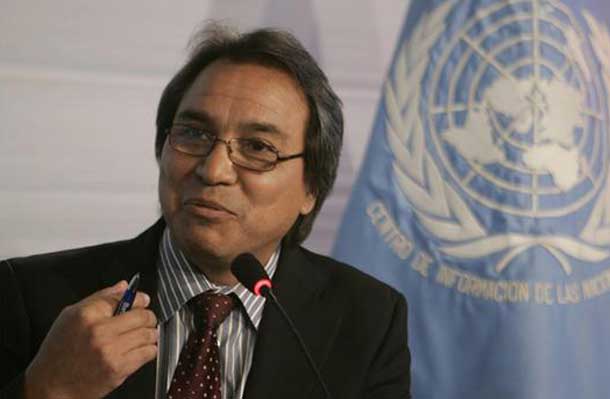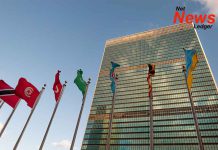
OTTAWA – Politics – I am now concluding my visit to Canada in my capacity as United Nations Special Rapporteur on the rights of indigenous peoples. Over the last nine days I have met with federal and provincial government authorities, and with First Nations, Inuit, and Métis leaders, organizations and individuals in several parts of the country. In addition to being in Ottawa, my meetings have taken me to various places, including indigenous territories, in British Columbia, Alberta, Saskatchewan, Manitoba, Ontario, and Québec.
I am grateful to the Government of Canada for its cooperation and for the information it has provided, and for allowing me to carry out my visit freely and in an independent manner. I would also like to express my deep gratitude to representatives of indigenous peoples who invited me to visit their territories and communities across Canada, and to those indigenous organizations and individuals who assisted me in organizing parts of my agenda. Finally, I especially want to thank the indigenous peoples with whom I met for sharing with me their stories, concerns and aspirations. I am honored to have been welcomed into their communities and territories, and am truly humbled by their hospitality and warmth.
Over the past several days, I have collected a significant amount of information from indigenous peoples and Government representatives across the country. In the following weeks, I will be reviewing the extensive information I have received during the visit in order to develop a report to evaluate the situation of indigenous peoples in Canada and to make a series of recommendations. This report will be made public, and will be presented to the United Nations Human Rights Council. I hope that that this report will be of use to First Nations, Inuit, and Métis people, as well as to the Government of Canada, to help find solutions to ongoing challenges that indigenous, or aboriginal, peoples in the country face. In advance of this report, I would like to now provide some preliminary observations and recommendations on the basis of what I have observed during my visit. These do not reflect the full range of issues that were brought to my attention, nor do they reflect all of the initiatives on the part of federal and provincial governments related to indigenous issues.
Canada, with its diverse and multicultural society, has been a leader on the world stage in the promotion of human rights since the creation of the United Nations in 1945. And it was one of the first countries in the modern era to extend constitutional protection to indigenous peoples’ rights. This constitutional protection has provided a strong foundation for advancing indigenous peoples’ rights over the last 30 years, especially through the courts. Federal and provincial governments have made notable efforts to address treaty and aboriginal claims, and to improve the social and economic well being of indigenous peoples. Canada has also addressed some of the concerns that were raised by my predecessor following his visit in 2003. These include actions to remedy gender disparities in the Indian Act and to providing access to the Canadian Human Rights Commission for claims based on the Indian Act. Additionally, Canada has adopted the goal of reconciliation, to repair the legacy of past injustices, and has taken steps toward that goal.
But despite positive steps, daunting challenges remain. From all I have learned, I can only conclude that Canada faces a crisis when it comes to the situation of indigenous peoples of the country. The well-being gap between aboriginal and non-aboriginal people in Canada has not narrowed over the last several years, treaty and aboriginals claims remain persistently unresolved, and overall there appear to be high levels of distrust among aboriginal peoples toward government at both the federal and provincial levels.
Canada consistently ranks near the top among countries with respect to human development standards, and yet amidst this wealth and prosperity, aboriginal people live in conditions akin to those in countries that rank much lower and in which poverty abounds. At least one in five aboriginal Canadians live in homes in need of serious repair, which are often also overcrowded and contaminated with mould. The suicide rate among Inuit and First Nations youth on reserve, at more than five times greater than other Canadians, is alarming. One community I visited has suffered a suicide every six weeks since the start of this year. Aboriginal women are eight times more likely to be murdered than non-indigenous women and indigenous peoples face disproportionately high incarceration rates. For over a decade, the Auditor General has repeatedly highlighted significant funding disparities between on-reserve services and those available to other Canadians. The Canadian Human Rights Commission has consistently said that the conditions of aboriginal peoples make for the most serious human rights problem in Canada.
It is clear to me that Canada is aware of and concerned about these issues, and that it is taking steps to address them. I have learned about numerous programs, policies and efforts that have been rolled out at the federal and provincial levels, and many of these have achieved notable successes. However, it is equally clear that these steps are insufficient, and have yet to fully respond to aboriginal peoples’ urgent needs, fully protect their aboriginal and treaty rights, or to secure relationships based on mutual trust and common purpose. Aboriginal peoples’ concerns and well-being merit higher priority at all levels and within all branches of Government, and across all departments. Concerted measures, based on mutual understanding and real partnership with aboriginal peoples, through their own representative institutions, are vital to the long-term resolution of these issues.
Importantly, Canada has taken action toward the goal of reconciliation between aboriginal and non-aboriginal Canadians with the 2008 government apology for the residential schools and the creation of the Truth and Reconciliation Commission. The Truth and Reconciliation Commission has been documenting the horrifying stories of abuse and cultural dislocation of indigenous students who were forced from their homes into schools whose explicit purpose was to destroy their family and community bonds, their language, their culture, and their dignity, and from which thousands never returned. Generations of aboriginal children grew up in residential schools estranged from their cultures and languages, with devastating effects on maintaining indigenous identity. It is clear that the residential school period continues to cast a long shadow of despair on indigenous communities, and that many of the dire social and economic problems faced by aboriginal peoples are directly linked to that experience. I urge the Government to ensure that the mandate of the Truth and Reconciliation Commission be extended for as long as may be necessary for it to complete its work, and to consider establishing means of reconciliation and redress for survivors of all types of residential schools. In addition, I would like to emphasize that the mark on Canada’s history left by the residential schools is a matter of concern to all of Canada, not just aboriginal peoples, and that lasting healing can only truly occur through building better relationships and understanding between aboriginal peoples and the broader society.
Another aspect of the long shadow of residential schools, combined with other historical acts of oppression, is the disturbing phenomenon of aboriginal women missing and murdered at the hands of both aboriginal and non-aboriginal assailants, whose cases have a much higher tendency to remain unresolved than those involving non-aboriginal victims. Certainly, both federal and provincial governments have taken steps targeted at addressing various aspects of this issue. Yet over the past several days, in all of the places I have visited, I have heard from aboriginal peoples a widespread lack of confidence in the effectiveness of those measures. I have heard a consistent call for a national level inquiry into the extent of the problem and appropriate solutions moving forward with the participation of victims’ families and others deeply affected. I concur that a comprehensive and nation-wide inquiry into the issue could help ensure a coordinated response and the opportunity for the loved ones of victims to be heard, and would demonstrate a responsiveness to the concerns raised by the families and communities affected by this epidemic.
These and further steps are required to realize the promise of healing and a new relationship that was made in the 2008 apology. Among all the government and aboriginal people with whom I have met, there is agreement that improving educational outcomes for aboriginal people is a key to addressing many of the other problems facing them. I commend the governments at both levels for placing a high priority on education. However, I have heard remarkably consistent and profound distrust toward the First Nations Education Act being developed by the federal government, and in particular deep concerns that the process for developing the Act has not appropriately included nor responded to aboriginal views. In light of this, I urge the Government not to rush forward with this legislation, but to re-initiate discussions with aboriginal leaders to develop a process, and ultimately a bill, that addresses aboriginal concerns and incorporates aboriginal viewpoints on this fundamental issue. An equally important measure for improving educational outcomes, and one that could be implemented relatively quickly, is to ensure that funding delivered to aboriginal authorities for education per student is at least equivalent to that available in the provincial educational systems.
As was stressed to me throughout my visit, it will be difficult to improve educational outcomes without addressing the substandard housing conditions in which many aboriginal people live. Young people described to me the difficulty they have studying in small homes overcrowded by generations of family members. Other social problems have also been linked to these overcrowded conditions, including high rates of tuberculosis and other health problems, family violence, unemployment, and unwanted displacement to urban centres. Overcrowding of homes leads to increased wear and tear and the premature deterioration of existing housing stock, resulting in dilapidated and often unsafe housing conditions.
It is abundantly clear that funding for aboriginal housing is woefully inadequate. The housing problem has a significant economic and social impact; the Chief of one community I visited indicated that if adequate housing were available, the vast majority of his community’s members with university degrees—nurses, teachers, engineers—would choose to return home. A woman from the same community who more typically had not had the opportunity to attend university, told me that as she became an adult she had no chance of having a house of her own, but rather was forced to remain in her parents home for years to come, with few prospects for developing a life on her own. “It is as if I’m not a person”, she said. I urge the Government to treat the housing situation on First Nations reserves and Inuit communities with the urgency it deserves. It simply cannot be acceptable that these conditions persist in the midst of a country with such great wealth.
By all accounts, increased investment in building self-governing capacity is essential to creating socially and economically healthy and self-sufficient aboriginal communities. One hundred and thirty years of Indian Act policies persistently undermined—and in some cases continue to undermine—many First Nations’ and Inuit peoples’ historic self-governance capacity. Enhancing economic development opportunities is also crucial to restoring and building healthy and vibrant aboriginal nations and communities. I acknowledge the many initiatives by Canada to strengthen aboriginal governance and catalyze economic development. And I applaud the many successes a number of aboriginal communities have had in building governance capacity and pursuing economic development opportunities.
But at the same time I note the frustration expressed to me uniformly by aboriginal leaders that their self-governance capacity and economic development, and improved conditions more generally, remain impeded by the multiple legacies of the history of colonization, treaty infringements, assault on their cultures, and land dispossession suffered by their peoples. To address these legacies Canada has developed specific and comprehensive claims processes that in many respects are models for the world to emulate. There are noteworthy success stories arising out of these procedures. But in their implementation overall, the claims processes have been extremely slow and mired in challenges—challenges that appear in most cases to stem from the adversarial structure of negotiations, in which entrenched opposing positions often develop on key issues and agreement simply cannot be reached. To make this worse, resource development often proceeds at a rapid pace within lands that are the subject of protracted negotiations between aboriginal peoples and the Government, undermining the very purpose of the negotiations.
The Government has rightly acknowledged problems with the claims processes. In 2008, it took action to reform the claims processes, including by imposing a time limit for settlement of specific claims. I commend the Government’s recent efforts to establish high-level oversight committees on treaty and comprehensive claims, which I hope will help to address in a timely fashion many of the concerns shared by both Government and indigenous peoples related to these processes. In this context, in re-thinking the available claims processes, I encourage the Government to take a less adversarial, position-based approach in which it typically seeks the most restrictive interpretation of aboriginal and treaty rights possible. In this regard, the Government should instead acknowledge that the public interest is not opposed to, but rather includes, aboriginal concerns. The goal of reconciliation that has been cited by the Government and indigenous peoples alike requires a more generous and flexible approach that seeks to identify and create common ground. Further, as a general rule, resource extraction should not occur on lands subject to aboriginal claims without adequate consultations with and the free, prior and informed consent of the aboriginal peoples concerned.
More generally, greater efforts are needed to improve avenues of communication between Canada and aboriginal peoples to build consensus on the path forward. In all my meetings with aboriginal leaders and community members it was evident that there is a significant level of discontent with the state of relations with federal and provincial authorities, as well as a widely held perception that legislative and other decisions over multiple matters of concern to them are being taken without adequate consultation or consideration of their inherent and treaty rights. I urge the federal Government especially to work with aboriginal peoples, through their representative institutions and authorities, to overcome this condition of mistrust. As with the Education Act initiative mentioned earlier, unless legislative and other government actions that directly affect indigenous peoples’ rights and interests are made with their meaningful participation, those actions will lack legitimacy and are likely to be ineffective.
In order for the Government to move forward to address the concerns of indigenous peoples in partnership with them, it is necessary to arrive at a common understanding of objectives and goals that are based on full respect for indigenous peoples’ constitutional, treaty, and internationally-recognized rights. Indigenous leaders from First Nations with historical treaties repeatedly expressed to me their yearning for the friendship, respect and sharing of resources that they understand the treaties to embody, and aboriginal leaders look to future arrangements based on similar premises. Such aspirations provide a much stronger grounding for a Canada respectful of human rights than a premise of indigenous subjugation and extinguishment of rights.
In addition to historical treaties and constitutional principles, the international standards endorsed by Canada and aboriginal peoples, in particular the United Nations Declaration on the Rights of Indigenous Peoples, should inform the definition of common objectives and goals. Canada’s 2010 endorsement of the Declaration marked an important step on the path towards reconciliation with indigenous peoples, and Canada should be commended for joining most all of the rest of the countries of the world in support of this instrument. I was pleased to hear, throughout my visit, references by First Nations, Inuit and Métis people to the Declaration, and about the incorporation of its standards into their work. It is my hope that the provincial and federal governments in Canada, as well as the country’s courts, will aspire to implement the standards articulated by the Declaration. The Declaration can help to provide a common framework within which the problems that I have outlined here in a preliminary fashion can be addressed.
I look forward to developing more detailed observations and recommendations beyond these initial comments in my report to the Human Rights Council. My observations and recommendations will be aimed at identifying good practices and needed reforms in line with the Declaration on the Rights of Indigenous Peoples and other international instruments that mark Canada’s international human rights obligations. I hope that this process will contribute to ensuring that the indigenous peoples of Canada can continue to thrive and maintain their distinct ways of life as they have done for generations despite the long shadow of a history of misdealing, enriching Canadian society for the benefit of all.
James Anaya
United Nations Special Rapporteur on the rights of indigenous peoples







